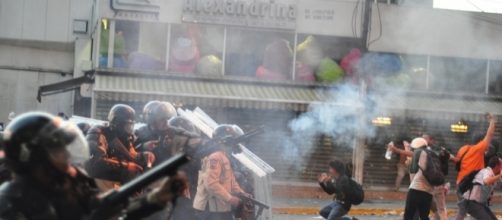One dead and several wounded by gunshots. After what was supposed to be a day of the peaceful demonstration, any sign of peace was far from present. Unfortunately, it seems that it will be a while before peace comes to this country.
The perfect storm
In the face of a debilitating economic crisis (the value of oil, Venezuela's main export, has fallen by nearly 70% and inflation is up 200%) and increasing political upheaval, Venezuela’s president, Nicolas Maduro, scheduled a constitutional referendum to be held on July 30th. The proposed constitution is deeply unpopular as it would effectively give Maduro the power to dissolve all government bodies, including the opposition-packed National Assembly.
To voice deep misgivings about the deteriorating state of affairs, Venezuela's opposition leaders staged a symbolic poll in voting booths across the country. Although turnout was lower –at 7 million– than the 11 million that opposition leaders had hoped for, 70 percent of participants voted against the new constitution, according to Datanalisis. The polling stations were also visited by several heads of other Latin American states who stood in a show of solidarity with the opposition.
Violence and vindictiveness
The low turnout was far from the only issue. Local media reported that government-backed militias had taken aim at opposition protesters, forcing many to seek refuge as the gun shots rained down.
A similar phenomenon occurred when a gunman opened fire at a meeting of the Venezuela’s National Assembly earlier this summer. In an attempt to further undermine the opposition, Maduro’s government held its polls, labeling them simulations for the July 30 referendum. These were denounced by the opposition, with leader Henrique Capriles commenting on Maduro’s failure to attend his poll.
Parapeto simulacro fraude constituyente fue tan malo que ni proponente @nicolasmaduro asistió!En un rato resultados de #HoyDecideElPueblo
— Henrique Capriles R. (@hcapriles) 16 July 2017
Time for the U.S. to do better
If all of this seems complex, it is because it is. That doesn’t mean the United States should turn a blind eye.
Venezuela represents a burgeoning human rights crisis. Data from the Central University of Venezuela indicate that the average Venezuelan lost 19 pounds in 2016. There is also an impending migration crisis as tens of thousands have fled the country. This development will only add to the massive number of Central Americans seeking asylum in the U.S. Another critical concern is the recurrent evidence of narco-trafficking coming out of Venezuela. Despite the sanctions placed on him by the Trump administration earlier this year, Venezuela’s Vice President Tarek El Aissami has, among other things, sold 135 passports to drug traffickers according to CNN. Such flamboyant support for the drug trade will only increase if Maduro gets his way with the new constitution.
It appears the US has taken a very hands off approach to the addressing the issue. Secretary of State Rex Tillerson was not present at a meeting of the Organization of American States in June, indicating a U.S. reluctance to become involved. This way of thinking is pernicious and allows an explosive situation to fester in the United States’ backyard. It’s time for American officials to get serious about Venezuela.


